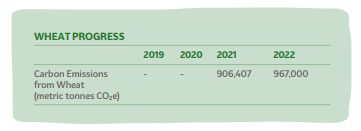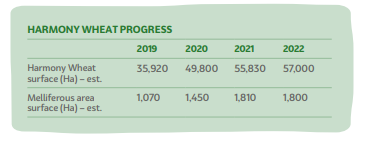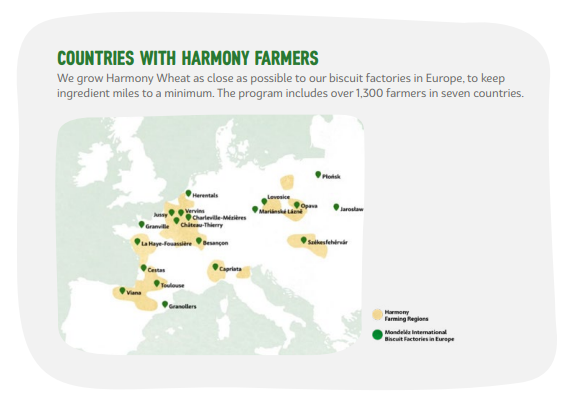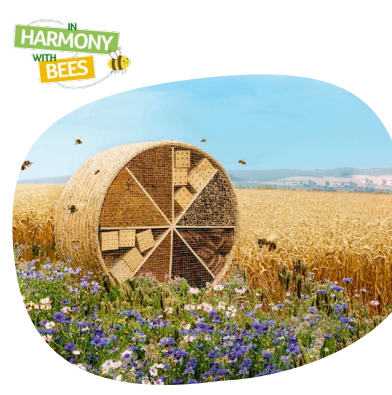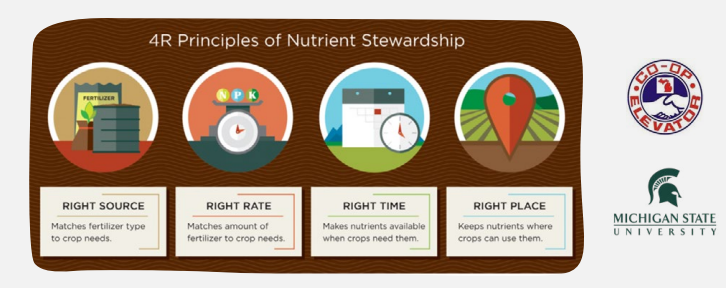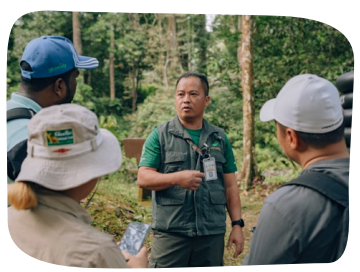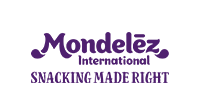Mondelēz 2022 Snacking Made Right Report: More Sustainable Ingredients
Mondelēz 2022 Snacking Made Right Report
A more sustainable supply of key raw materials such as cocoa, wheat, dairy, and palm oil is critical to the continued growth and success of our business, to the resilience and prosperity of the communities producing these raw materials, and to the protection of the landscapes the ingredients are grown in.
More sustainable production of our key ingredients also contributes to our carbon footprint reduction goals while protecting biodiversity. As a global snacking leader dedicated to making snacking right, we are determined to lead in helping to drive sector-wide transformation for more sustainable sourcing at scale.
Enhancing social sustainability and respecting human rights is key to this goal as is a larger focus on helping to promote and restore biodiversity across the landscapes our business touches. We focus where we believe we can make the greatest difference and help tackle the most important issues to help foster security of supply, care for the environment, and support the people and communities that grow the key ingredients for our well-loved snacks.
Our Progress
230,000 230,000 farmers participated in the Cocoa Life program in 2022, compared to 209,954 in 2021.4
74% Child Labor Monitoring & Remediation Systems (CLMRS) coverage in West African Cocoa Life farming communities vs. 61% in 2021.2
100% Palm oil sourced from suppliers aligned to Palm Oil Action Plan (POAP).
We have a distinctive approach to help drive long-term change for the better at scale. It has a number of key pillars: leading in more sustainably-sourced key ingredients, pioneering approaches that holistically help tackle root issues, helping to drive sector-wide transformation through collaboration, and sharing and learning from impact data assessing the positive progress made by our programs.
OUR 2025 GOAL
Our ambition is to source our key ingredients – including cocoa and wheat – more sustainably and support economically and socially resilient communities. These two ambitions mutually support and reinforce each other, and are at the heart of our aim to create a future where together people and the planet thrive.
To this end, we have set the following goals:
100% Cocoa volume for chocolate brands sourced through Cocoa Life by 20251
100% Wheat volume needed for Europe business biscuits production grown under the strengthened Harmony Regenerative charter by 20303
“Over the past 10 years through the implementation of our signature sustainable sourcing programs including Cocoa Life and Harmony wheat, we have gathered meaningful data confirming our approach is helping to deliver the type of change we’re aiming to scale for greater impact. We are determined to seize this opportunity to go further, faster."
Cathy Pieters
Vice President Sustainable Ingredients
Mondelēz International
WHEAT
As one of the world's leading biscuit manufacturers, we remain focused on sourcing wheat that is grown more sustainably.
Our goal for our European business is to have 100% of the wheat volume needed for our biscuit production grown under the strengthened Harmony Regenerative charter by 20301 while we continue to learn from our North American wheat sustainability programs.
Across Europe and North America, we focus on sourcing the wheat we need for our biscuits in more sustainable ways. We do this through sourcing programs that allow us to work with wheat farmers to help implement advanced agronomy practices that help conserve water, care for the soil, protect and promote biodiversity, and reduce GHG emissions. We also engage with governments and NGOs as part of our commitment to progress, transparency, and continuous improvement.
HARMONY WHEAT
We are expanding our impact with Harmony, our signature European wheat sustainable sourcing program. Our goal for 2030 is to grow 100% of the wheat volume needed for our Europe business biscuits production under our strengthened Harmony Regenerative charter.1
Championing More Sustainable Wheat in Europe Since 2008
We created the Harmony program 15 years ago with the ambition to change the way wheat is grown in Europe, help limit our impact on the environment, and deliver quality wheat for our biscuits.
Created along the wheat supply chain with farmers, cooperatives, millers as well as agronomists, environment specialists, and NGOs, the Harmony program seeks the commitment of local farmers to follow more sustainable practices in wheat farming. Our Harmony charter champions farming practices that aim at improving soil health, reducing carbon emissions, protecting biodiversity, and preserving water.
Created as the first program of its kind in 2008 with just a handful of farmers, Harmony now collaborates with over 1,300 farmers across seven European countries (Belgium, the Czech Republic, France, Hungary, Italy, Poland, and Spain), uniquely combining scale with a signature local partnership approach. Harmony has developed a strong and unique data reporting system on farming practices that enhances traceability from wheat storage to factory. Our aim is to calculate and monitor a set of economic and agro-environmental performance indicators, such as nitrogen use efficiency, GHG emissions, or pesticides use. Key results are shared with our wheat chain to fuel a continuous improvement approach and our charter is reworked to further reduce our environmental footprint. External audits are conducted by independent and certified organizations (SGS, Bureau Veritas) to confirm compliance with the Harmony charter. 100% of mills, 100% of storage bodies, and 10% of partner farmers are audited every year – over 300 audits were performed in 2022.
OUR GOAL PROGRESS
98%
At the end of 2022, approximately 98% of the volume of wheat needed to produce our biscuits across our Europe business was grown under the Harmony charter.
Wheat volume needed for Europe business biscuits production grown under Harmony charter:
2019 - 65%
2020 - 76%
2021 - 91%
2022 - 98 %
17 Million Bees
30 butterfly species
Observed in Harmony fallows at harvest 2022
Expanding Our Impact in 2022
Approximately 98% of the wheat volume needed for our Europe business biscuits production was grown under the Harmony charter by the end of 2022. We had the aim to reach 100% by the end of 2022 but missed by less than two percentage points because of unfavorable climatic conditions in the last two years, including extreme wet conditions during the harvest in 2021 and drought in 2022. To hedge potential climatic disruptions and evolving needs in our factories, we have started to book additional wheat volumes in the 2022-2023 wheat cycle to help to secure 100% wheat needs coverage in the future.
As protecting local biodiversity, pollinators in particular, is one of the critical challenges in wheat farming, we have multiplied by four the surface of melliferous fallows over the last decade, reaching over 1,800 hectares throughout Europe in 2022. We estimated over 17 million bees and 30 butterfly species in our Harmony melliferous fallows at harvest 2022.
We promote the importance of our Harmony program for the environment to consumers, through TV, digital, in-store, and PR campaigns.
Accelerating Our Progress with Harmony Ambition 2030
Harmony Ambition 2030 will accelerate the program’s progress through an across-the-board embrace of Regenerative Agriculture, a holistic approach to farming which aims to produce high-quality crops while also restoring the natural rhythm of our surrounding ecosystem.
Harmony Ambition 2030 will focus on making a lasting impact across three key areas: environment, farmers, and consumers.
1. Environment:
Harmony Ambition 2030 aims to help mitigate climate change and reverse biodiversity losses by implementing a strengthened charter of regenerative farming practices. These practices will help reduce GHG emissions from Harmony wheat fields. For example, we will ask our participating farmers to diversify crop rotation by including legumes to help optimize fertilizer use, the main source of GHG emissions in wheat farming. We will also take an ambitious approach to biodiversity protection in European wheat farming by widening action from Harmony plot to whole farms, and from pollinators to overall wildlife. Harmony farmers will aim to eliminate the most damaging pesticides, including glyphosate and neonicotinoids.
2. Farmers:
To support Harmony farmers in their transition to Regenerative Agriculture, we will create the Harmony Academy, which will provide farmers with a holistic package of digital and on the ground training. In addition, we will aim to equip farmers with digital tools to help them record farming practices, calculate environmental impact KPIs, and improve the efficiency of reporting. These tools will help empower farmers to measure their own environmental impact, informing and supporting future sustainable decision-making on farms.
3. Consumers:
A new program, run by Mondelēz International’s own research team, will look to research more sustainable wheat and its impact on quality.
To support Harmony Ambition 2030, the program will be guided by a newly-created Harmony Council. The Council will be an independent panel of scientific experts from external organizations such as Arvalis (a French technical institute run by farmers), INRAE (a world leading research organization in agriculture, food, and environment), and Noé (a biodiversity NGO), who will provide strategic recommendations designed to support our commitment to Regenerative Agriculture.
“Harmony Ambition 2030 is a key part of our sustainability strategy. We are working with our local farmers and partners across Europe to help create an environment where the wheat for our well-loved biscuits is grown in thriving and biodiverse environments. All this is part of our long-term business growth ambition and mission to offer consumers the right snack, for the right moment, made the right way.”
Peter Seymour
Senior Vice President Marketing & Strategy, Europe
Mondelēz International
Investing to Further Develop Knowledge on Climate Change Mitigation in Wheat Farming
In line with our continuous improvement mindset, we are aiming at identifying new levers for our farmers to support Harmony Ambition 2030, especially to help decrease GHG emissions from wheat production. In 2022, we kicked-off an on-field initiative, implemented in a selection of Harmony cooperatives in various regions of France, with the aim to modernize our biscuit wheat portfolio. We are screening the biscuit wheat varieties based on their optimal environmental, technological and farmer profitability performance in multiple sites. Learnings out of this pilot project will be shared with our wheat chain via the Harmony Academy before being deployed more widely on the field.
“We kickstarted Harmony Ambition 2030 with a test and learn model in France in 2022, with participating farmers sowing Harmony wheat under our new Regenerative Charter for harvest in 2023. This strengthened charter of farming practices was built hand-in-hand with our wheat chain through a series of workshops, including 40 stakeholders and participants. We are excited to take the learnings from this pilot and apply them to a wider European roll-out over the next few years, starting with Belgium in 2023, Central Europe in 2024, followed by Spain and Italy in 2025.”
Marie Ellul-Karamanian
Harmony Program Lead
Mondelēz International
Pioneering More Sustainable Wheat with Our Brands in 2023
To continue our focus on enhancing biodiversity, we will involve our consumers in a pioneering initiative to help protect wild bees through our Local Heritage Brands. It all starts from a simple insight: wild bees are important (75% of global food crops producing fruits or seeds for human use as food depend, at least in part, on pollinators),1 but they are threatened (40% of pollinators species, especially bees and butterflies, are threatened with extinction),1 mainly due to a lack of food sources and destruction of their habitat.The Harmony program is already addressing the lack of food sources with its actions in favor of biodiversity. Indeed, the charter requires that each participating farmer sets up at least one action in favor of biodiversity, with a specific focus on pollinators, for example dedicating a minimum of 3% of Harmony wheat field to honey fallow flowers or implementing hedges or melliferous intercrops on Harmony fields right after harvest.
As part of the initiative, we are creating bee hotels installed in Harmony melliferous fallows, starting from Spring 2023. These bee hotels have been designed specifically for wild bees, with the support of the NGO Noé, and have been handcrafted in France using natural materials. With approximately 6,000 holes made of different materials, the bee hotels will allow many potential insects to nest and reproduce. To date, we have installed 32 bee hotels in Europe, including 10 in Spain, 9 in France, 8 in Czech Republic, and 5 in Italy, which could in theory allow over half a million new bees to live after the first year. To engage consumers in the protection of biodiversity and the safeguarding of wild bees specifically, four biscuit brands – LU in France, Fontaneda in Spain, Opavia in Czech Republic, and Oro in Italy – have launched this initiative in Spring 2023.
“As farmers, we have a large responsibility to feed the world and it is therefore critical we continue enhancing the health of our soil. The earlier we implement Regenerative Agriculture practices on the ground, the larger the benefits we will have.”
Pawel Kaczmarek
Harmony Farmer,
TopFarms, Poland
NORTH AMERICA WHEAT
Working Together
In North America, we have been actively working to gather on-farm data to improve measurement of environmental topics like water and GHG emissions, while identifying key impact areas for improvement in both precision agriculture and conservation agriculture. Some of the wheat farmers we are collecting data from have already adopted practices that help protect the soil and optimize fertilizer use, such as using cover crops, implementing crop rotation, and practicing reduced tilling.
Since 2015, we have collaborated with Michigan State University (MSU) and our supplier of soft white winter wheat, Cooperative Elevator Co., an agricultural cooperative based in the thumb of Michigan and established over 120 years ago. Together, we have engaged a group of over 100 family farmers to anonymously track their farming practices, use of inputs such as fertilizer, and their yields. Through this program, participating farmers can track their own year-over-year performance, as well as benchmark themselves versus peers to develop improved agricultural practices while optimizing yields.
Learning Together
The study shows how these improvements are driven by better data, enabling better decision-making by farmers. Once the project report is ready after each harvest, the growers in the program receive their individual reports and attend an annual meeting where we go over the program’s aggregated data and environmental results. The meeting is hosted by the Cooperative Elevator Co. and the data is presented by their lead agronomist. The growers have the opportunity to ask questions about the data and learn best practices from each other. We also take the opportunity to share an update about our corporate goals, sustainability agenda, and ambition.
Collectively, the program forms a group of common practices with a harmonized goal of producing the highest quality wheat mindful of the ecological footprint. Its success has encouraged the Cooperative Elevator Co.’s agronomy team to make the program’s learnings more widely accessible to all their growers including those outside the program.
Adopting Science-based Tools
In 2020, after listening and incorporating feedback from growers in the program, we became a member of Field to Market: The Alliance for Sustainable Agriculture. We also adopted Field to Market’s Fieldprint Calculator, an industry standard science-based tool that allows us to gather information on-farm in a more efficient way.
We continue to be an active member, learning from peers in the market and contributing to the evolution of the alliance. In 2022, we deepened our understanding of the metrics gathered and the application of science-based metrics on wheat fields. The results allow us to solidify an on-the-ground baseline and help shape the program with the goal of improving the environmental footprint of the wheat we source.
SUPPORTING THE 4-RS
"We support our supplier Cooperative Elevator Co.’s 4-R fertilizer placement strategy, whereby trained, certified, and dedicated agronomists determine the Right Source, Right Rate, Right Time, and Right Place for a specific operation in order to allow fields to be farmable for years to come. The aim is to be the best stewards of the land, to make it possible to feed the world for years to come."
To learn more visit the Coop Elevator’s website.
DAIRY
We continue to work closely with farmers and other partners to enhance the sustainability of our dairy sourcing.
OUR GOAL PROGRESS
73%
Dairy supply sourced from suppliers with formal animal welfare standards.2
Driving Down Carbon Emissions from Dairy
Dairy accounts for approximately 21% of our overall carbon footprint, and we are focused on driving this down. By 2025, we aim to reduce end-to-end CO₂e emissions by 10%.1
We see animal welfare as inseparable from the climate impact of dairy farming – there is a clear link between healthy, productive animals and lower emissions. So we are working with farmers on both fronts – to decrease emissions and improve animal welfare. Typical elements for carbon improvement at a farm level include the selection of feed sources, fertilizer and slurry usage, herd health, and yield from forage.
We have initially focused on our liquid milk supply, where we can work with our dairy suppliers. This is a key step towards working with our remaining supplier network to encourage them to monitor carbon emissions on farms, set reduction targets, and report on progress.
Taking Action
We work closely with dairy suppliers to encourage and support them in measuring CO₂e and taking action to reduce, track, and report on carbon emissions yearly. Currently, suppliers providing 86% of our dairy spend are committed to doing a baseline and starting actions on CO₂e reductions. In 2022, we started a system of grants to support members of cooperatives in the reduction of carbon emissions. Projects are both direct and indirect, including renewable energy, livestock management, and welfare and tree-planting.
Making Progress
Throughout the year, a number of farmers who we work with across Europe made commitments and progress in reducing carbon emissions.
In the UK and Ireland, 100% of farmers supplying milk for Cadbury Dairy Milk are tracking their GHG emissions on farms and working on action plans to reduce emissions. Approximately 70 farmers in the Selkley Vale group, for example, have completed their baseline and are in year two of their reduction program – to date, achieving an 8% reduction vs. baseline. This is equivalent to taking over 6,000 cars off the road.
85% of dairy farmers who supply Milka in the Alpine region (Lactallis-Ravensburg) have completed their baseline and are also in year two of their reduction program - to date, achieving a 4% reduction vs. baseline.
Moreover, FrieslandCampina Professional has signed a four-year agreement with us to reduce by 14% the carbon emissions of milk supplied by FrieslandCampina’s member dairy farmers. The broad set of on-farm initiatives to work towards achieving this goal range from optimizing water management to improving manure storage and biodiversity.
Testing New Techniques
Together with Olam Food Ingredients (OFI), we have started a pilot program in Poland with the support of Wageningen University to baseline a number of local farms and test new techniques aiming to reduce 10% of CO₂e by 2025.
With Molkerei Ammerland and Milchlieferunggenossenschaft (MLG), we committed to baseline a number of local farms in northern Germany with the aim to achieve an 8 to 10% reduction of CO2 e by 2025.
In Spain, we have started discussions with our supplier Calidad Pascual to help drive baselining efforts and start a local reduction program.
“Working with Mondelēz International and our suppliers in Poland can allow for traceable improvements of the climate footprint from the dairy farms until the final product. We are collaborating on a sustainability program in Poland to assess, define and implement the interventions needed to reduce the GHG emissions on dairy farms to help meet our shared goals for climate-friendly dairy, paving the way for net-zero and regeneration of natural capital.”
Andreas Zweifel
Head of Sustainability Dairy
OFI
Improving Animal Welfare
The Alpine Charter also requires farmers to work to continuously improve animal welfare and rewards them for improvements in key animal health indicators, such as somatic cell count and total animal losses.
Our animal welfare programs involve setting clear expectations with our suppliers and taking feedback from external experts to drive continuous improvement. Our supplier expectations are reinforced through regular tracking and reviews via our supplier management process, ensuring that specific topics such as dehorning and antibiotic management procedures are kept high in priority. We also carry out an annual dairy supplier sustainability survey, which captures the percentage of their supply covered by formal animal welfare schemes, including whether farms are subject to third-party animal welfare audits, which welfare schemes and standards are applied, the average arithmetic somatic cell count as an indicator of general herd health, and their policy on the use of antibiotics on their farm. In 2022, approximately 73% of our dairy supply was sourced from suppliers following formal animal welfare standards.
Providing Guidance
We provide guidance to suppliers, which starts with asking them to know their on-farm GHG emissions footprint and share their plans for reduction by 2025. Suppliers can use any GHG calculation tool provided it follows the International Dairy Federation (IDF) methodology.
The first action we ask suppliers to take is to examine their livestock feed sourcing and to ensure any soy is certified or sourced from a no-deforestation risk location.
Working in Partnership Across Industry Platforms
Partnerships are critical for achieving our goals. In 2021, we joined the Sustainable Agriculture Initiative (SAI) Platform, to work with industry, research institutes, and peers to advance sustainability in dairy and crops through shared standards and creating consensus to raise the bar. We are participating members in the Dairy working group and Dairy Sustainability Partnership.
We are also supporting Danone’s Margarita program with smallholder dairy farmers in Mexico. Running since 2011, Margarita aims to strengthen dairy farming in Mexico by consolidating resilient business models and farming systems. As part of this program, we are helping to build successful farming businesses that can grow more sustainably with healthy livestock and extended environmental stewardship.
As well as working directly with our suppliers, we recognize the benefits of sector collaboration. This is why we have joined with Field to Market, Cool Farm Alliance and SAI Platform to collaborate on best practices with an aim to advance more sustainable agriculture supply chains.
Cage-free eggs
We use eggs as ingredients in a few of our products. We are striving for virtually 100% of our egg supply globally to be cage-free by 2025 (excluding Ukraine and Russia), to have a positive impact on animal welfare while maintaining food safety and quality standards.
At the end of 2022, approximately 43% of eggs supplied globally were cage-free, excluding Russia and Ukraine volume.1
We are part of a joint industry call to the EU Commission and Members of the EU Parliament, seeking a phase out of the use of cages in animal farming, and a revision of animal welfare legislation to ban the use of cages in animal farming across the EU. In other countries and regions where cage-free supplies are more challenged and consumer demand is lower, we engage in dialogue with suppliers, governments, and other stakeholders to encourage the availability of viable cage-free supplies.
Turning Waste into Food for Cage-Free Eggs Chickens
In Vietnam, we have provided seed funding of $30,000 for Green Connect, a social enterprise to scale up and transform food waste and organic trash into feed to raise cage-free eggs chickens. In 2022, Green Connect was able to collect about 5 tonnes of food waste per month from our factory in Vietnam. The aim is to collect 20 tonnes of food waste per month in 2023 (18 tonnes of organic food waste and two tonnes of egg shells).
PALM OIL
We remain fully focused on sourcing palm oil more sustainably – working with partners on all fronts, from tackling deforestation to helping to protect the rights of people along the supply chain.
OUR GOAL PROGRESS
100%
In 2022, we again achieved our 2025 goal of sourcing 100% of our palm oil from suppliers aligned to our Palm Oil Action Plan (POAP).
Additionally, we continued to achieve 100% Roundtable on Sustainable Palm Oil (RSPO) certified palm oil sourcing in 2022.1
Working Together for Sustainable Palm Oil
Since we first published our Palm Oil Action Plan (POAP) in 2014, we have been working with our suppliers and across industry to help transition the sector to a more sustainable supply of palm oil.
We believe that when palm oil is produced and supplied responsibly, it has the potential to benefit people and nature thanks to its high efficiency and contribution to socioeconomic progress in the rural locations where it is grown. But we recognize more needs to continue to be done to help ensure the protection and promotion of nature, wildlife, people, and climate. To this end, we support legislation in the EU and elsewhere on the sourcing of deforestation-free palm oil and will work along our supply chain to ensure adherence to enhanced requirements.
Enhancing More Sustainable Sourcing
We are working with our suppliers with the aim to source palm oil that is free from deforestation, conversion of other natural ecosystems, and exploitation of people. All potential new suppliers of palm oil to our company must successfully complete a robust, third-party supported supplier qualification process. Only suppliers that demonstrate full alignment with our requirements and expectations as outlined in the POAP are approved to supply to us. POAP requirements and expectations are also embedded in our contracts with all existing suppliers of palm oil to our company.
As of the end of 2022, we continued to source 100% of our palm oil from suppliers aligned to the POAP. We also maintained 100% palm oil RSPO Certified.
Assessing Alignment
We don’t just require suppliers to ensure sustainable and traceable supply to our company. Indeed, we were the first multinational consumer goods company to require suppliers to trace all the oil they sell, not just the oil they sell to us. We track supplier alignment to our POAP and continuous improvement toward more sustainable supply chains, via the Palm Oil Transparency Coalition (POTC) Trader & Supplier Assessment and our annual palm oil supplier questionnaire. The results of these assessments are aligned with our sourcing strategy, where we maintain business with suppliers aligned with our requirements and expectations, and exit those that are not.
Enhancing our Supplier Management
Looking ahead, we will be working with our partners at Peterson Control Union (PCU) and ProForest to enhance our supplier management processes and verify supplier reported information. We are also adopting the No-Deforestation, No-Peat, and NoExploitation Implementation Reporting Framework (NDPE IRF). The NDPE IRF is a common reporting framework used across the sector to monitor adoption and successful implementation of NDPE upstream from the refinery. We will henceforth require our suppliers to submit NDPE IRF profiles of shared suppliers annually. These profiles will be verified by PCU. We will isolate underperforming suppliers and take action via our direct suppliers to ensure we move shared suppliers to “Progressing” or “Delivering” status.
Taking Accountability
Our POAP aims to minimize the risk of deforestation, conversion, and exploitation occurring in our supply chain. However, we acknowledge that sometimes issues do still occur. We, therefore, operate a robust third party-supported grievance process to ensure issues are investigated and non-compliant suppliers are held to account.
When there is a significant breach of our requirements, we suspend that supplier from our supply chain and engage with them to ensure a time-bound action plan is fully implemented and the issues fully remediated. Before re-entering these suppliers into our supply chain, a re-entry assessment is completed and reviewed by a third party. Only suppliers that demonstrate alignment with our POAP are re-entered.
Ensuring Transparency
By the end of 2022, our suppliers reported that approximately 99% of the palm oil we source is traceable to mill, with approximately 88% traceable to the plantation.
Annually, we require our suppliers to share the list of mill crushers active in our shared supply chains. Supplier reported data is checked against public and proprietary information and is reviewed, deduplicated, and improved continuously via a process supported by our partners at ProForest, PCU, and Satelligence. Following this process, we publish our annual mill list on our company website to ensure transparency.
Satelligence takes mill data and available concession maps to trace our extended supply chains in Malaysia and Indonesia back to production-level. This represents approximately 88% of the total volume of palm oil we source. Where concession maps don’t exist, we assume that a mill may be sourcing from all locations within a 50km radius of its location. Once our supply chain is mapped, Satelligence satellite monitoring is used to identify and alert us to potential deforestation events where we may need to act.
Additionally, we require our suppliers to deploy satellite monitoring along their upstream supply chains.
In 2023, we are working with Satelligence and PCU to enhance supply chain transparency via more robust data verification and enhanced systems capabilities.
Collaborating
In 2022, we accounted for less than 1% of total global demand for palm oil. As such, we recognize that we alone cannot transition the sector to a more sustainable supply. That’s why we lead or are active participants in leading global organizations focused on improving the palm oil supply chain, including the Consumer Goods Forum Forest Positive Coalition (CGF FPC), Consumer Goods Forum Human Rights Coalition (CGF HRC), POTC; Palm Oil Collaboration Group (POCG), and Roundtable on Sustainable Palm Oil (RSPO).
Via our leadership and participation, we are working with peer companies to create common standards, tools, and programs of work designed to support the transition to sustainable palm oil supply and protect critical landscapes.
Investing in Palm Oil Landscape Programs in Indonesia and Malaysia
As co-lead of the CGF FPC Production Landscapes group, we aspire to bring about large-scale change through investments in landscape programs in Indonesia and Malaysia. These programs are centered on responsible production and more sustainable supply of palm oil within the most sensitive locations we source from. In North Sumatera and Aceh, Indonesia, we have been a Coalition Sustainable Livelihood (CSL) initiator and member since 2018.
In 2021, we began partnering with Conservation International to invest in an agroforestry project in North Sumatera. The aim is to advance social forestry programs, as well as provide guidance for future investments intended to promote the transition to more sustainable palm oil supply in the region. Approximately 120 stakeholders are involved in this project, with two landscapes prioritized for action.
In 2022, we established a new partnership with the Global Palm Oil team at WWF to promote sustainable production of palm oil and raise awareness about high conservation value areas. This project has a two-fold approach. Firstly, to build the capacity of key stakeholders in the palm oil value chain to conduct HCV assessments in Sabah, Malaysia. This will allow us to better manage and protect critical landscapes and promote responsible and sustainable production by plantation owners and operators. Secondly to raise awareness about traceability to plantation tools like WWF's Hamurni, which will facilitate greater supply chain transparency and accountability. By encouraging the adoption of sustainable practices among plantation owners and operators, we hope to promote greater environmental stewardship and contribute to the long-term viability of the palm oil industry.
Read more in the Mondelēz 2022 Snacking Made Right Report
1 Goal and reported information for cocoa volume sourced is based on a mass balance approach, which means that the equivalent volume of cocoa needed for the products sold under our chocolate brands is sourced from the Cocoa Life program.
2 Reported information for the period from January 1, 2022 to December 31, 2022 includes a community as covered by CLMRS if the work of identifying children, if any, in or at risk of child labor has been completed by the end of the year, even if any appropriate remediation and post-remediation follow-up occurs in the following year. CLMRS data is provided by third parties. Includes Ghana, Cote d'Ivoire and Nigeria.
3 Regenerative Agriculture is a holistic approach to farming which aims to produce high-quality crops while also restoring the natural rhythm of our surrounding ecosystem.
4 Reported information covers Brazil, Côte d'Ivoire , Dominican Republic, Ghana, Indonesia, India, and Nigeria. This data is provided by third parties.
1 Regenerative Agriculture is a holistic approach to farming which aims to produce high-quality crops while also restoring the natural rhythm of our surrounding ecosystem.
1 Source: Food and Agriculture Organization of the United Nations, Why bees matter, May 2018
1 Annual GHG emissions are accounted for following the GHG Protocol Corporate Standards and using the operational control approach. Reporting includes activities of all Mondelēz International subsidiaries across all regions, except those acquired after December 31, 2021. All acquisitions until 2021 are incorporated in our GHG emissions for 2018, 2021 and 2022. In the reporting year 2022, we have recalculated our base year, 2021 and 2022 inventory following the GHG Protocol Corporate Standards. For more details, please see the Carbon Accounting Manual.
2 Excludes materials procured by third-party external manufacturers & co-packers for use in manufacturing Mondelēz International finished goods.
1 Goal and reported information excludes Russia and Ukraine (Russia to be determined and Ukraine by 2027). Excludes eggs procured by third-party external manufacturers & co-packers for use in manufacturing Mondelēz International finished goods. The term "egg(s)" means egg(s) produced by hens (female chickens).
1 Excludes palm oil procured by third-party external manufacturers & co-packers for use in manufacturing Mondelēz International finished goods.

